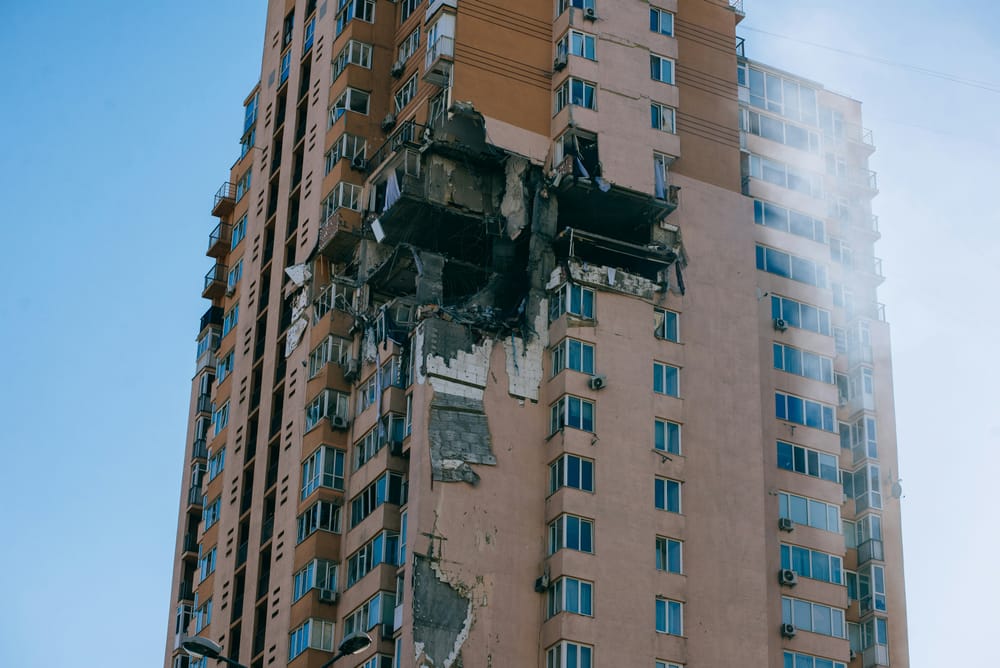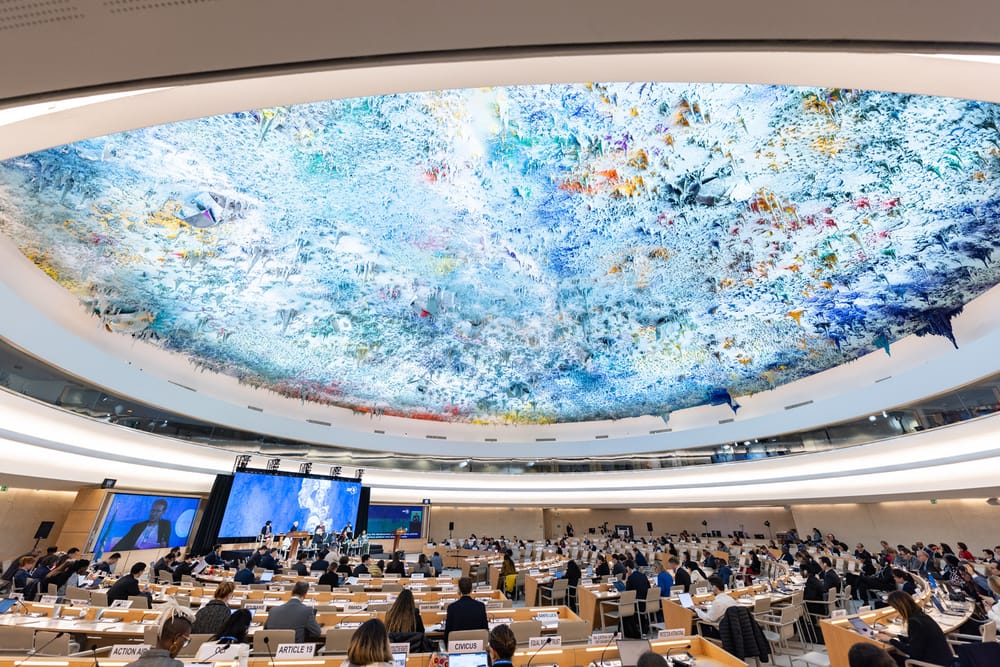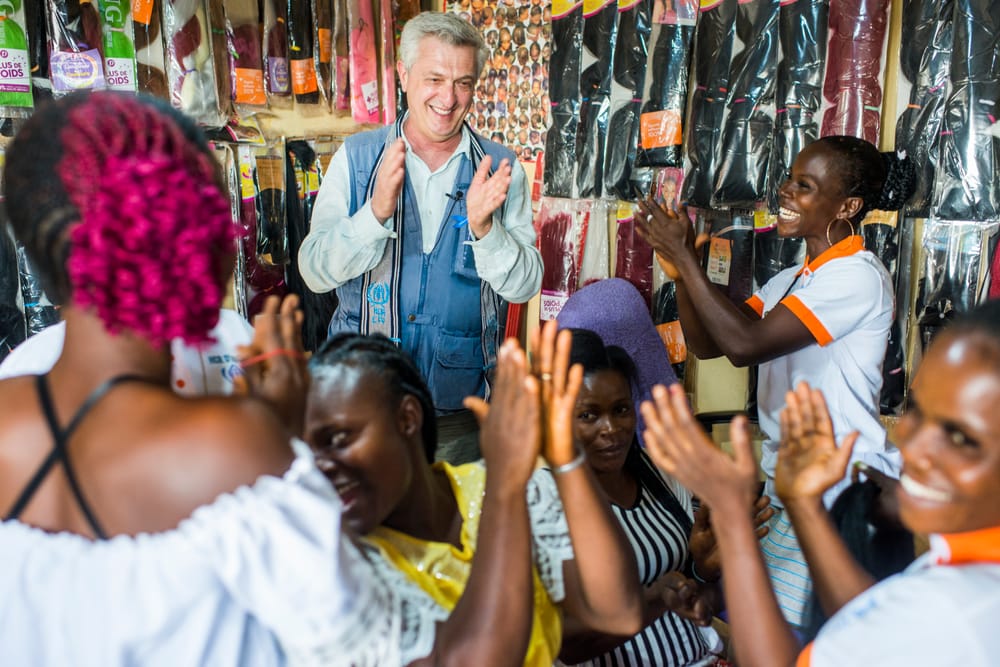By Fred Tanner
From the Geneva talks to the Minsk Agreements
Russia's war against Ukraine began in March 2014, and not in 2022. After the Maidan Revolution, Russia annexed Crimea and fomented violent separatism in the Donbas, resulting in over 13,000 deaths and millions of displaced people. International Geneva, along with its international organisations and NGOs, has been instrumental in aiding Ukraine with conflict resolution and humanitarian relief efforts.
The first major meeting to work towards a peaceful resolution of the Ukraine conflict was held in Geneva in April 2014, bringing together the foreign ministers of the United States (US), the European Union (EU), Russia, and Ukraine. Seven hours of intense negotiations by the “Geneva Contact Group” culminated into a "Geneva Joint Statement" which outlined concrete steps including disarming illegal groups, amnesty, constitutional reform, dialogue, and the strengthening of the Organization for Security and Cooperation in Europe (OSCE).
Peace cannot be achieved unless it is credible, enforceable, and sustainable.
Regrettably, the Geneva Statement proved to be short-lived, but the agreed upon steps became the guardrails of the subsequent Normandy Format driven peace process (set up by Germany, France, Russia, and Ukraine), which ultimately led to the Minsk Peace Accords. The Minsk agreements, which sought a peaceful end to the conflict in eastern Ukraine through a ceasefire, troop withdrawals, elections, and political reforms, were particularly controversial in Ukraine. Some viewed it as legitimising Russia's claims to Ukrainian territory. For these reasons, the implementation of the Minsk agreements have been stalled. Peace cannot be achieved unless it is credible, enforceable, and sustainable.
In the run-up to the 2021 US-Russia summit at the historic Villa Grange in Geneva, there was a sense of optimism regarding potential progress in Ukraine's quest for peace. However, President Biden and President Putin merely paid lip service to the Minsk agreements, and instead prioritised bilateral strategic arms control discussions. The stark contrast between the conciliatory diplomatic tone in Geneva, followed by Russia's full-scale invasion of Ukraine a few months later was striking. This led the US and Russia into a de-facto state of war with one another.
Peace negotiations amid full-scale war
Russia's invasion of Ukraine in 2022 shattered the Minsk negotiation format, the only remaining multilateral framework for diplomatic solutions. To the surprise of many, just four days after the invasion, the warring parties found their way to the negotiating table, first in Belarus, then in Istanbul. Even while being subject to massive attacks, Ukraine established backdoor channels and opened communication with Russia via Turkey in preparation for negotiations.
Ukraine made significant concessions with its "Istanbul Communiqué" that outlined conditions for a ceasefire, including permanent Ukrainian neutrality, and international security guarantees. Ukraine suggested a 15-year freeze on Crimea’s status, but Russia refused to compromise on its core demands regarding the control of Crimea and the “Donbas republics”. To resolve the impasse and address criticism of inaction, the UN Secretary-General proposed a peace plan featuring the following: a ceasefire, Russian troop withdrawal, humanitarian access, and political dialogue. However, as the battlefield dynamics shifted and Russian war crimes were uncovered, hopes for a peaceful settlement faded.
During the conflict, hope hinged on sustained international pressure. China's peace plan for Ukraine, though more aspirational and principled than actionable, opposed nuclear escalation and reflected China's growing concerns. This was also evident in its appointment of a special envoy for Eurasian Affairs. Other peace proposals, mainly from BRICS and African nations, suggested territorial concessions to Russia in exchange for peace. President Zelenskyy categorically rejected any proposals that would cede Ukrainian territory to Russia, insisting that victory over Russia was the only acceptable outcome.
During the conflict, hope hinged on sustained international pressure.
President Zelensky extended his own 10-point peace plan in May 2023, by introducing a peace campaign through meetings in Copenhagen, Jeddah, and Malta, culminating in a peace summit. This innovative approach utilised working group methods to engage and empower countries from the Global South, which may have otherwise been indifferent to the European conflict and Ukraine's plight.
Humanitarian diplomacy in the Ukraine conflict
Given the realities of the ongoing war and the shortcomings of previous diplomatic attempts, the focus of international negotiations shifted to humanitarian concerns with the aim of "saving lives", according to former Ukrainian mediator Rustem Umerov. Ukrainian mediators, who had previously been engaged in talks with Russia in Belarus and Istanbul have transitioned to humanitarian mediation. This encompasses negotiations on prisoner exchanges and the creation of humanitarian corridors for evacuating civilians from cities under siege.
A remarkable humanitarian accomplishment amid the war was the Black Sea Grain Initiative (BSGI), brokered by the Office of the UN Secretary-General and supported by Türkiye. The Centre for Humanitarian Dialogue (HD), a Geneva-based NGO, played an important role in creating this intricate construct by building a coalition "from the outside in" with the UN and other external actors, before engaging Ukraine and Russia. Unfortunately, the BSGI failed owing to the rigour of the EU sanctions regime and Russian obstinance.
The International Atomic Energy Agency (IAEA) pursued courageous humanitarian diplomacy to prevent a nuclear catastrophe in Ukraine’s conflict zones. The agency developed a plan to create a demilitarised nuclear safety zone around the perimeter of the Zaporizhzhia Nuclear Power Plant. Simultaneously, on-site IAEA inspectors implemented plant safety measures outlined in the "Grossi Plan": a set of seven essential steps for Ukrainian nuclear security. Director General Grossi confirmed the IAEA's continued presence when he stated: "We are not going anywhere."
Recovery and reconstruction
More than 20 UN agencies, international organisations, and NGOs (including several based in Geneva) worked closely with the Ukrainian government on peacemaking, humanitarian action, and reconstruction initiatives. In Geneva, the Maison de la Paix and its institutions aided the Ukrainian government through capacity building, humanitarian demining, security sector reform, and track 1.5 dialogues to address security guarantees, nuclear risk reduction, and post-war reconstruction. The inter-agency facilitation network known as the Geneva Peacebuilding Platform (GPP) enabled information sharing for these initiatives, in collaboration with UN agencies and other international organisations based in the city. Similarly, NGOs had active involvement in various areas. For instance, the ALIPH foundation's efforts in Ukraine were crucial in safeguarding the country's cultural heritage for future generations.
Ukraine relied on various stakeholders for reconstruction, including international organisations, donor countries, private enterprises, and civil society. The "Lugano Principles" were established at the Ukraine Recovery Conference in Lugano to provide a shared framework for reconstruction, in addition to the EU's "seven steps" for accession negotiations. Looking ahead, Geneva-based organisations could further champion Ukraine's needs for recovery, particularly in economic reform, mine action, anti-corruption, and security sector governance.
Global challenges beyond Ukraine: Geneva's preparedness for 2024
International Geneva's recent track record serves as a solid groundwork for managing the consequences of Ukraine’s ongoing war in 2024. Nevertheless, the global perspective for the upcoming year appears grim. Geostrategic bias is gradually eroding the foundations of global governance principles and the rules-based international order. Armed conflicts in the Middle East, Ukraine, and other regions continue to have a catastrophic impact on the fate of millions of people.
International Geneva, its constituent organisations, and networks need to anticipate a surge in requests in 2024 that encompasses mediation, humanitarian aid, reconstruction, and hosting peace talks.
Consequently, International Geneva, its constituent organisations, and networks need to anticipate a surge in requests in 2024 that encompasses mediation, humanitarian aid, reconstruction, and hosting peace talks. To successfully navigate these challenges, they must prepare both at headquarters and in the field. This entails enhancing inter-agency cooperation, resource pooling, improving effectiveness, ensuring access, upholding duty of care, reducing bureaucratic hurdles, sharing best practices, and fostering robust relationships with all conflict parties. By taking such steps, International Geneva can be better positioned to meet the demands of a changing world.
About the author
Fred Tanner, Ambassador (ret.), is Visiting Professor at the Geneva Graduate Institute, a Research Associate at the Institute’s Centre on Conflict Development and Peacebuilding (CCDP) and an Associate Fellow at the Geneva Centre for Security Policy (GCSP). The author extends his appreciation to Dr. Peter Batchelor for sharing valuable insights in crafting this article.
The opinions expressed in this publication are those of the authors. They do not purport to reflect the opinions or views of the Geneva Policy Outlook or its partner organisations.





